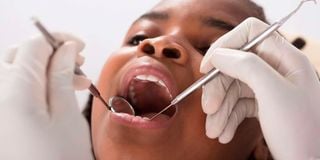The anatomy of bad breath: Causes and treatment

Saliva helps to wash away food particles and bacteria in the mouth.
What you need to know:
- Bad breath, whether temporary or chronic can be embarrassing.
- Talk to your doctor or dentist so that the cause can be identified.
- Diabetes, Kidney failure and liver cirrhosis affect blood chemical and hormone balance leading to poor oral health.
Do you struggle with bad breath? Also known as halitosis, bad breath is a problem that affects many people. It can be temporary, only occurring when you eat certain foods or when you skip brushing your mouth in the morning. This can be resolved by brushing your teeth or chewing gum.
For some people, however, the condition is chronic and may be caused by conditions beyond oral hygiene. For such people, bad breath can be embarrassing and can lead to self-isolation.
What causes bad breath?
There are many causes of bad breath, and they can be broadly classified into two categories – oral and non-oral.
Oral causes
Poor oral hygiene: Food particles can rot and cause a foul smell when they remain between your teeth or at the back of your tongue.
Certain foods
When you eat certain foods like onions, garlic, and curry, the food particles get stuck in your teeth and gums. The bacteria on these particles break down the food and release a foul-smelling gas.
Dental problems
Dental problems such as gum disease, cavities, and plaque can cause bad breath. Plaque is a colourless biofilm that forms on your teeth and gums. It contains bacteria, which release volatile sulphur compounds (VSCs). These compounds are the main source of bad breath.
Smoking
Smoking increases the risk of bad breath. Cigarettes contain a large number of chemicals that affect oral health and lead to issues such as periodontal disease, gum inflammation, and teeth discoloration.
Post-nasal drip
This occurs when mucus accumulates in the back of your throat or nose due to colds, allergies, or sinus infections.
Dry mouth
Saliva helps to wash away food particles and bacteria in the mouth, preventing bad breath. When you don't produce enough saliva, especially at night, the risk of bad breath increases.
Non-oral Causes
Smoking
In addition to affecting oral health as discussed above, smoking also affects the lungs and airways. This can lead to chronic bronchitis, which causes bad breath.
Lung infections
Lung infections such as pneumonia, bronchitis, or tuberculosis cause inflammation, increased mucus build-up in the throat, leading to halitosis.
Gastrointestinal disorders
Gastrointestinal issues like acid reflux disease (GERD) are a common cause of bad breath. If you experience heartburn, and acid reflux, the bad breath could be from the gases and acids released from the stomach.
Systemic diseases
Diabetes, Kidney failure and liver cirrhosis affect blood chemical and hormone balance leading to poor oral health. Periodontal disease, for instance, has been observed to occur more often and more severely in diabetic patients.
Some medications
Lots of medications decrease the flow of saliva and cause a dry mouth as an after-effect. These medications include antidepressants, high blood pressure drugs, and sedatives. Antihistamines, COPD medications, and some antibiotics.
How is Bad Breath Treated?
The treatment for bad breath depends on the cause. For oral causes, proper dental hygiene is key – brushing teeth twice a day and flossing at least once a day.
If the cause is non-oral, the treatment will focus on the underlying condition. For example, if bad breath is caused by GERD, then medications to treat GERD will be prescribed.
In some cases, surgery may be required to address certain dental or gastrointestinal problems.
Don't self-isolate, solutions are available
Bad breath, whether temporary or chronic can be embarrassing. However, it's important to remember that many people suffer from bad breath at some point in their lives. Approach it as just a symptom of a disease. Talk to your doctor or dentist so that the cause can be identified. You may even get an early diagnosis of an illness you didn’t think you have. With treatment of the underlying problem and proper dental hygiene, you can treat halitosis permanently.




